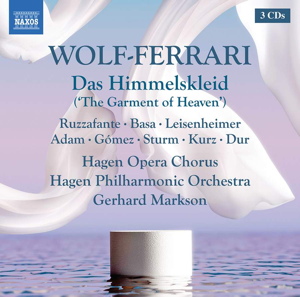
Ermanno Wolf-Ferrari (1876-1948)
Das Himmelskleid (1927)
Angelina Ruzzafante – Princess (soprano)
Sibrand Basa – Prince (tenor)
Reinhard Leisenheimer – Chancellor (tenor)
Stefan Adam – Prince Korbinian (Baritone)
Sergio Gómez – Prince Gudolin/ Beggar (Bass)
Peter-Martin Sturm – Prince Fridolin (tenor)
Michael Kurz – Prince Pippin (tenor)
Anna-Maria Dur – Moonfairy (mezzo)
Opera Chorus, and Augmented Chorus of Theater Hagen
Hagen Philarmonic Orchestra/Gerhard Markson
rec. 1996, Stadthalle Hagen, Germany
Booklet with notes in English and German
Naxos 8.660518-20 [3 CDs: 166]
The composer Ermanno Wolf-Ferrari is mostly remembered these days as an early 20th C composer of works that are notable for their humour and concise musical ideas. Operas such as Il Segretto di Susanna and Il Quattro Rusteghi are among his more celebrated achievements. The breadth and symphonic scope of Das Himmelskleid or the Garment of Heaven, comes as something of a surprise upon first encounter with it. The excellent booklet notes of Astrid Reich quote the composer at the time of the premiere as saying, “It is a work of stillness, born of stillness, and calling for stillness.” With that one statement the composer pretty much sums up the entire three hours of music. This is an opera in which, after a fairly cataclysmic close to the First Act, it then proceeds to unwind with no other real action occurring for the remaining two hours. Indeed, the Second Act, which invloves the Prince searching the various heavens for their “garments”, is 84 minutes of nothing actually occurring. On hearing it, I felt as if Wagner had taken the scene with Parsifal and the Flowermaidens and stretched it out to unbelievable proportions. One of the Air spirits actually comments “He is really doing nothing”; enough said. The main problem here is the composer’s own ponderously spiritual libretto which aims for loftiness but forgets to add warmth and humanity, something that writer Hugo von Hoffmanthsal managed so brilliantly for Richard Strauss for Die Frau Ohne Schatten.
The composer is enough of a musician to supply the work with some very beautiful pages of music. His music is very good when it comes to atmospheric scene-setting. Most often the musical themes don’t manage to develop into anything of substance, The Princess’ First Act scena is one of many examples of this. The scoring of the huge orchestra is lush and inventive. There are sections where Wolf-Ferrari adds prominent sections for piano and percussion, which gives a Stravinskian flavour to those passages. After hearing this, It really comes as no surprise that the opera floundered after its initial production in Munich. Within a year the German opera world would be shaken up by Kurt Weill’s Die Dreigroschenoper, a work that sits at the polar extreme to the overinflated world of this one.
This recording is a re-release by Naxos of an earlier issue that appeared in 1997 on the Marco Polo label. It was recorded within 2 years of the first modern revival of the work by the Hagen Opera Company. Gerhard Markson led that revival and was called on to bring the cast together for this studio recording. He managed to assemble a fairly confident cast to breathe some life into this opera again. The Princess is one of those Turandot types, who send their men off on impossible quests to win their hand. Angelina Ruzzafante brings a strong stage presence to the role with a solid, mostly gleaming, tone, one that is evenly produced throughout her range. She would certainly be a very welcome addition on any opera stage in the present day. Her main suitor, the Prince, is competently sung by Sibrand Basa. His is a lighter weight tenor than the music seems to call for but he sings cleanly and firmly throughout. His timbre is often reminiscent of René Kollo, but without that singer’s tonal weight or tendency to stray into unsteadiness. In the smaller roles, Reinhard Leisenheimer is an effective Chancellor but his upper range is on rather shaky footing. The greatest impression among the cast is made by the seductively lush mezzo of Anna-Maria Dur as the Moonfairy, who tries unsuccessfully to entrap the Prince for her own enjoyment. With a voice as beautiful as hers I would probably have settled down with her for a longer spell.
This is a huge and unwieldy score. Gerhard Markson demonstrates that he has mastered its difficulties thoroughly. The Hagen orchestra and extended chorus respond to him with power and sensitivity, the latter being required more frequently than one might have supposed on this long journey. That this recording manages to be successful at all is completely due to Markson’s astute leadership and the fine casting, despite the absence of starry names in the lineup. The sound engineering captures everything successfully in a natural sounding acoustic which helps a bit to tone down the somewhat bloated proportions of the work. Naxos has reissued the set with the original liner notes; however, they have left out the German text and full English translation of the Marco Polo release. The prospective listener would be better off to try to get their hands on a gently used copy of the Marco Polo issue for that reason.
Mike Parr
Help us financially by purchasing from





















